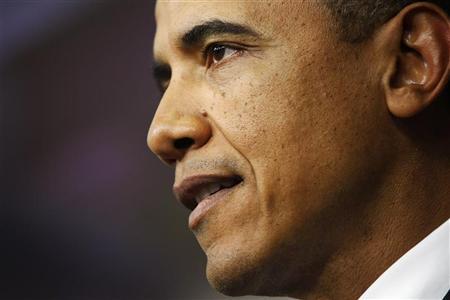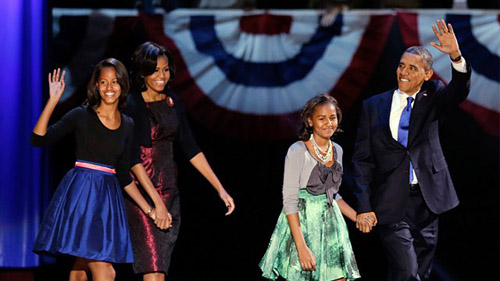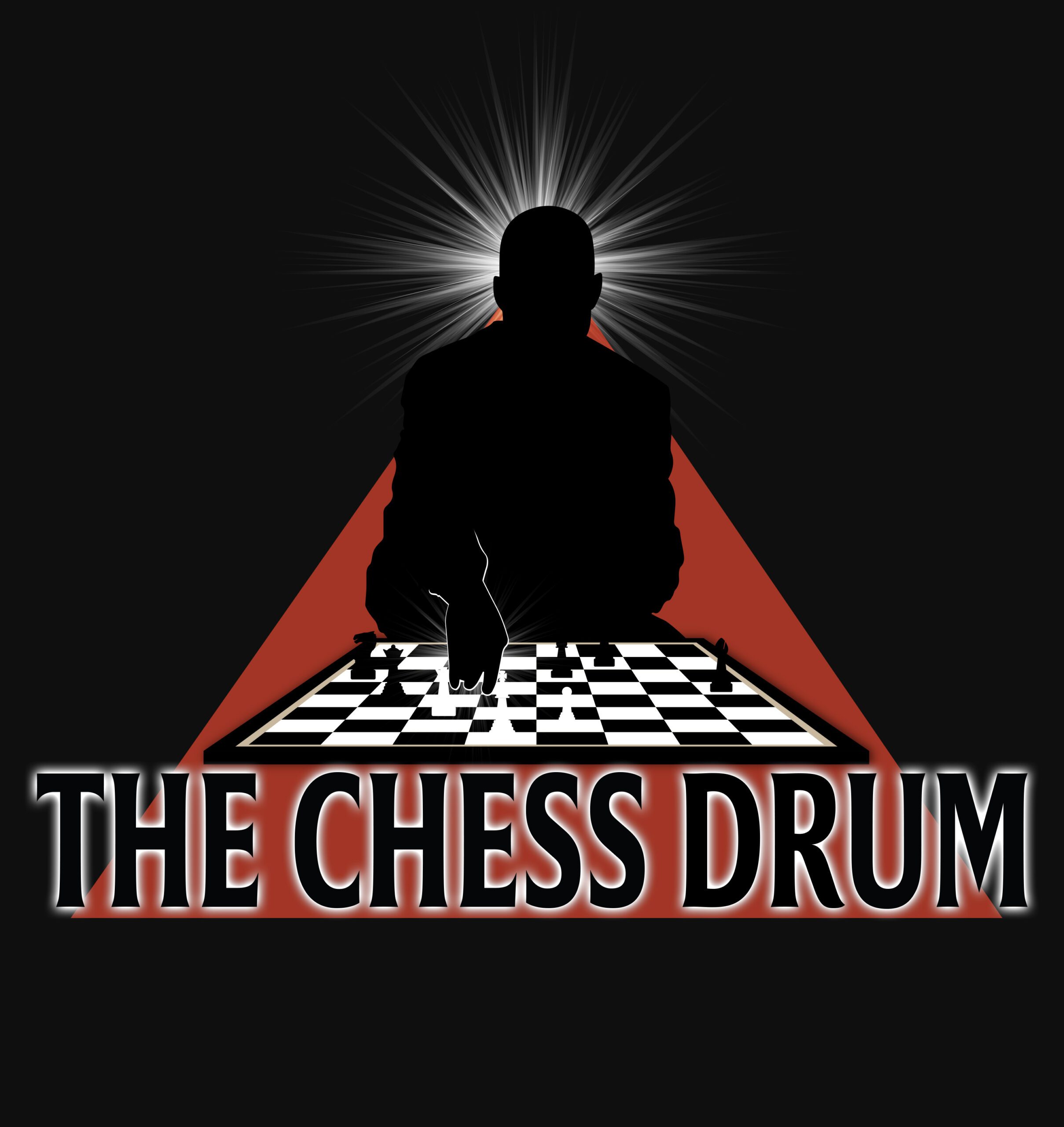The Obama (Chess) Challenge

Barack Hussein Obama
44th President of the United States
After having won his re-election bid and after his subsequent inauguration on January 21, 2013, President Barack Hussein Obama will embark on journey to cement his legacy. He won a very contentious race against Governor Mitt Romney with 51%-47% margin. The second term may also be accented by budget woes and the handling of several geopolitical landmines.
Obama has been compared to a chess player many times and there may be some evidence that he understands chess strategy quite well. However, second terms are a lot different from first terms. With a term limit of eight years, Obama will be able to focus on his agenda instead of concerning himself about approval polls for re-election. In his second term, he will be trying to complete his agenda and carve out a legacy for the annals of history.

The Obama family after incumbent Barack Obama won a second term.
President Obama still has so many questions to answer. What is the endgame in Afghanistan? Will his unpopular drone campaign continue? Will he make good on his campaign against gun violence in America? Will the economy rebound? Will there be a mending of the degraded educational institutions? Will Obama be able to navigate the restlessness of the Black community (who continue to lose ground in social and economic indicators)? These are all scenarios that will force him to navigate the landmines of a political chessboard.
Some have stated that Obama is the ultimate chess strategist although it is unclear how often he plays. His stately wife Michelle Obama talks of playing chess with her older brother so certainly there is some appreciation for our board game. Obama has mentioned support for chess in his previous campaign when addressing the Harlem Children’s Zone.
Given that there is the question of violence among the youth (as capture by several mass shootings and rampant violent in inner cities), the recent shooting of Hadiya Pendleton in Chicago shows that this issue will not die down anytime soon. Perhaps chess still has a place in helping some of these issues, but these programs must catch the problems early.
Organizations like the Hip Hop Chess Federation and Besomeone, Inc. are well-known at The Chess Drum, but perhaps such programs could receive more support. Both attempt to address issues of violence and using chess as a metaphor for making better decisions and conflict resolution.
Chess-in-Schools has exploded, but these programs are usually not well-funded in the types of schools where they are needed the most. In fact, part of the challenge for successful programs such as IS-318 in Brooklyn is funding. As seen in the movie, “Brooklyn Castle,” chess is often one of the first programs cut when there is a budget contraction.
One may believe that America’s social problems are cultural. The culture of violence permeates throughout American society and perhaps there is a need for a shift in how violent imagery is made so accessible to the youth. Perhaps a cultural shift may be at the heart of the second term. Could chess be the impetus used in aspects of social upliftment of youth? Perhaps. What is ironic is that chess is also popular in prisons and has been said to reduce prison violence and even recidivism.
Might is not always right and the U.S. government also has to set a better example in how it engages nations with whom it disagrees. Drones are now being used by other nations and cyberwarfare appears to be the next frontier of combat. The use of force tends to be the method used in international political discourse and video games are replete with these same military themes. Is it any wonder that our youth settle the most minor disputes (and criticism) with deadly force?
So what is President Obama’s next challenge? It may be figuring out how to navigate carefully in a world where other nations have either become war-weary or are arming themselves in an increasingly belligerent world. Obama, the chess player, will have to determine the style in which he will deal with conflict. Will he be Anand (the universalist), Fischer (the pragmatist), or Kasparov (the dogmatist)? He may turn out to be none of these, but at the end of his eight years, he will want to avoid political landmines and be seen as a world champion thinker.
The Chess Drum, “The Obama Challenge,” 14 January 2009.
The Chess Drum, “Barack Obama wins U.S. Presidency!” 5 November 2008.


Professor Shabazz,
Could you explain why you labeled Anand, Fisher and Kasparov those labels? And for the young Chess Masters, like Carlsen what would be their labels?
Anand tends to be a universal peacemaker as champion. Never gets embroiled in controversy… will concede to keep peace. Anand actually played Topalov (the challenger) in his country of Bulgaria when he was World Champion! That is unheard of. What other World Champion would have agreed to this??
Fischer… was so steadfast in what he thought was right and did not care what you thought. DURING his chess career, he had many chess philosophies… particularly that the Soviets were conspiring to fix tournament results. Nobody believed him, but he was not deterred. He turned out to be right. Then you have Kasparov, who wants to force everyone to accept his views one way or the other. He has a very strong approach and in his approach to FIDE and the government of Russia are good examples.
In my view, Obama will probably be more like Anand, but like Fischer in that he has to work much harder than the opposition to accomplish his mission. He’s already done this with the gun control. However, he cannot afford to have the boldness and dogmatism of Kasparov. It would not be a wise thing to do when the opposition has to compromise anyway.
It’s too early and Carlsen hasn’t been World Champion yet, so it’s hard to know him as a political strategist. However, I would say that Carlsen is more like Fischer in his political approach to chess. He has philosophical views and he sticks to his conviction. He doesn’t care what you think. He withdrew from the last World Championship cycle and that was that. He had his principle for doing this although many in the chess world had mixed reactions. He rejoined when things suited his situation.
I believe Aronian is also like Fischer with a bit of Anand’s persona. His issue with playing in Azerbaijan for the 2016 Olympiad is one recent example. He already made clear that he needed guarantees for his safety since Armenia and Azerbaijan are literal enemies. Armenia has threatened to withdraw as a participant and they are the defending champions. However, Aronian seems more willing to be diplomatic (like Anand) and is known for being reasonable.
I believe Bobby Fischer really set the tone for professional chess conditions. Kasparov said this himself the day after Fischer died. Players are more politically demanding these days. What will Obama be? Time will tell, but if he is smart, he could learn a few things from political styles of World Chess Champions. 🙂
Film critic Roger Ebert wrote a letter to President Obama on education and mentioned the movie, “Brooklyn Castle”! Interesting.
https://www.salon.com/2012/11/12/hello_mr_president_its_me_roger_ebert/
I’m not entirely sure you can apply one label to the President. He’s displayed different personas at different times during his tenure. He’s even shown those personas while dealing with the same issue. In that sense, I suppose one could call him a pragmatist, because he has done what he had to do to get his programs approved. But then again, most every two-term President ends up being one, because you can’t get anything done in Washington without the old give-and-take – and if you can’t get any legislation through, you generally won’t get re-elected.
That said, the second term of any post-FDR Presidency tends to be conducted with an eye toward the incumbent’s historical legacy. To that end, I would expect Obama to be much more Kasparov-like for the next 18 months or so. His clout will wane as the 2016 elections creep closer, so he has to use that window to get some of his tougher legislation through. (Note the change in his chief of staff – Rahm Emanuel and Pete Rouse were both loath to put together any legislative packages that might risk losing a straight up-and-down vote. Jack Lew probably won’t be that cautious.)
He also has to be careful not to burn too much political capital, because it’s well established that the electorate tends to get a “six-year itch” during a two-term Presidency – meaning that the opposition party often does very well during the second set of midterm elections. Democrats will have to work hard to keep the Senate, as they’re again defending a lot of seats (though Scott Brown passing on a shot at John Kerry’s seat helps), and have virtually no shot to retake the House, thanks to Republican redistricting in 2010. So the President will have to soften at least a little bit as the midterms approach. But I would expect him to be more idealistic until the primaries for 2014 are in full swing.
If forced to directly answer Daaim’s question, I guess I would go with Anand, which is probably a pretty good idea for most any President. He’s shown he can win pretty much anywhere, against anyone. However, I feel like the President also has a lot of Karpov in him, too – so many times, it seemed like he was backed into an impossible corner (especially with ARRA and ACA), made a few seemingly innocuous moves to start a withering counterattack, and came out with the win a little while later.
Interesting take on Obama as Kasparov…. the way he has dealt with some issues lately are certainly not Anand-esque. I believe people have said he is too much of a pacifistic and wants to please everyone, but you’re right… he has exuded a number of different approaches with some being quite dogmatic at times.
Karpov… hmmm. That may be a bit too conservative, but I do see your point. He can be quite adept at maneuvering. He is certainly an interesting strategist.
Anand also drove to the site after the volcano shut down flights in Europe and they wouldn’t even give him an extra rest day! Fischer never would done that.
Thank you for your 12 years of outstanding service to the Chess community. It would be great if President Obama would extend a real Chess challenge to celebrity Chess players. It would be motivating for young people to see people they admire playing Chess.